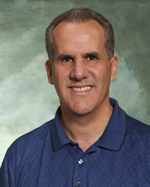Dr. Nat Schenker Serves Statistics as ASA President-Elect
Posted on by
As director of the Office of Research and Methodology, Dr. Nathaniel Schenker spends his working days absorbed in the details of the world of statistics, with emphasis on how they apply to National Center for Health Statistics (NCHS).
Outside of the office? He spends more time on the world of statistics, but with a more global view.
Dr. Schenker is president-elect of the American Statistical Association (ASA), an 18,000-member organization of statisticians from more than 90 countries serving in government, academia, and industry. He will assume the presidency in 2014, in time for the 175th anniversary of the association.
Dr. Schenker has a long history of involvement with ASA. He is starting his third term on the Board of Directors and was previously a vice president. Dr. Schenker has also been honored by ASA, which elected him a Fellow in 1995, and honored him with the Roger Herriot Award for Innovation in Federal Statistics in 2006 and its prestigious Founders Award for distinguished service in 2011.
Dr. Schenker says that his favorite ASA experience to date has been, while serving as a vice president, also chairing a working group that led to the creation of the annual Conference on Statistical Practice. Unlike ASA’s long-standing Joint Statistical Meetings, which focus primarily on research, the Conference on Statistical Practice targets statisticians interested in practical techniques, professional development, and reaching leadership roles within their organizations.
Dr. Schenker believes strongly in ASA’s role in increasing the visibility of the statistical profession. He cites the International Year of Statistics, now under way, as a good example. The concept of Statistics2013 originated in ASA in 2011, and major statistical societies around the world were quick to join the effort. To date, nearly 1,900 organizations—including NCHS—and 122 countries are participating.
As president-elect, Dr. Schenker has a full plate of duties. He will make a total of about 150 appointments to more than 50 committees. He has also developed a presidential agenda for 2014, which includes initiatives pertaining to education, publications, and the visibility and impact of the profession. His plans include having ASA work with educational institutions to revise guidelines for curricula for undergraduate majors and minors in statistics. The association will also develop training for statisticians in leadership and in the analysis of textual (i.e., unstructured, nonnumeric) data.
Dr. Schenker also plans for ASA to develop and launch a prototype of a statistical Web portal that would include important statistical information, such as government publications, course curricula, historical documents, and more that would not normally reside in journals. Such a portal has been under discussion for several years, and Dr. Schenker welcomes the opportunity to take it to the next level.
With regard to the visibility and impact of the profession, one topic of concern is what is generally known as “Big Data”—massive, often continually streaming data sets that are becoming increasingly more difficult to manage. The emphasis on technology and other such areas in addressing Big Data, Dr. Schenker feels, has taken the discussion outside of the statistical profession. He believes there is a need to carve out a role for statistical professionals to collaborate on Big Data problems, particularly when it comes to fundamental statistical concepts such as design of data collection, data quality, modeling, and the assessment of uncertainty. He says that there is also a need to train more statisticians to deal with Big Data, and that training in textual data will be a first step.
Dr. Schenker stresses that his work with ASA is an outside activity, independent of his work at NCHS. He is careful to avoid any conflict of interest, and recuses himself from discussion and voting on government-targeted issues. Nonetheless, he says he believes that his service as president-elect will benefit NCHS and other federal agencies by helping to strengthen the profession and bringing attention to the agencies’ work. He says he also hopes it will help in attracting more of the best and the brightest to the nation’s principal health statistical agency.
Posted on by

